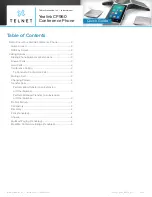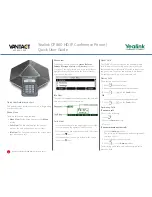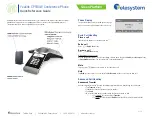
68
Firewall:
A security mechanism placed between networks, which restricts
certain types of data to devices behind the firewall.
H.323:
Standard defining videoconferencing over the Internet.
Home Gateway:
A term commonly interchanged with router. Also called a
residential gateway.
IP Address (Internet Protocol Address):
An IP Address is a number that
identifies a computer connected to the Internet. Every computer that is
connected to the Internet must have a unique IP Address. An IP Address
consists of four sections separated by periods. Each section contains
an 8-bit value represented as a number ranging from 0 to 255.
Public IP Address:
An IP Address that is not behind a NAT router. This
IP Address is visible from the Internet.
Private IP Address:
An IP Address that is behind a NAT, which is not
visible to the Internet. The preferred ranges for private IP Address are
either 192.168.x.x or 10.0.0.x.
Dynamic IP Address:
An IP Address for a particular network device
(PC, VideoPhone, router) that is dynamically assigned by a router or
ISP and will not remain the same from session to session. See DHCP.
Static IP Address:
An IP Address for a particular network device (PC,
VideoPhone, router) that doesn’t change. See DHCP.
ISP (Internet Service Provider):
A commercial organization that provides
subscribers with access to the Internet.
Keys (Encryption):
Encryption keys allow you to easily change wireless
encryption settings to maintain a secure network. The encryption key
can be of various lengths (e.g., 64, 128 or 256-bit).
LAN (Local Area Network):
A network that is designed to span small distances.
These are most commonly used in small buildings, businesses and
homes with multiple PCs. See WAN.
Glossary of Terms (continued)












































